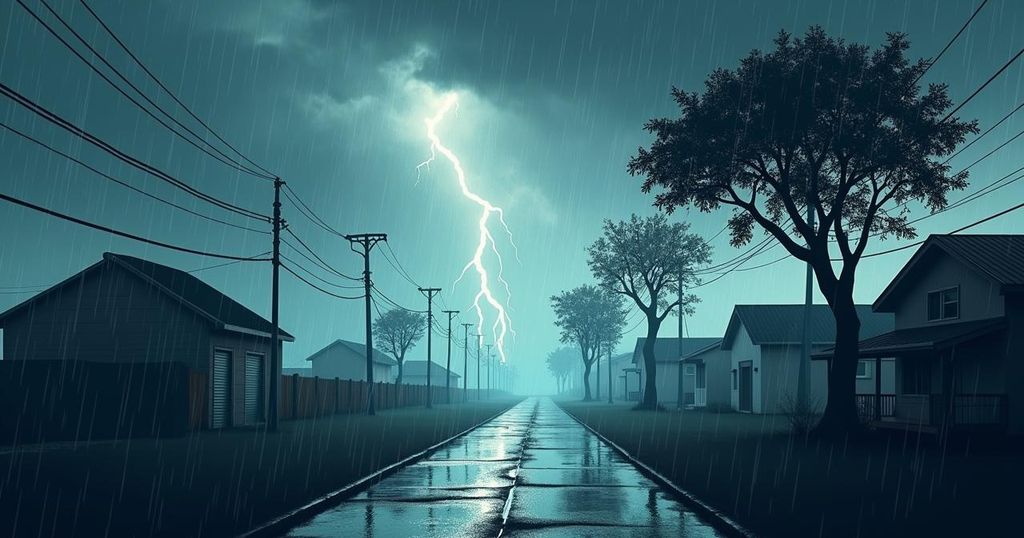The Impact of Climate Change on Hurricanes: Insights from Hurricane Helene and Milton

Human-induced climate change significantly intensified Hurricane Helene, increasing rainfall by 10% and wind speeds by 11%. Similar effects are expected with Hurricane Milton, raising concerns over future hurricane tendencies and inland flooding as climate change exacerbates storm intensity.
Recent research indicates that human-induced climate change has significantly increased the impact of Hurricane Helene, resulting in approximately 10% more rainfall and an 11% increase in wind speed. The study released ahead of Hurricane Milton, which also threatens the Florida coast, highlights alarming trends attributed to global warming. Specifically, the warming climate raised Helene’s wind speeds by an impressive 13 miles per hour and contributed to ocean temperatures in the Gulf of Mexico that were between 3.6 degrees Fahrenheit and 2 degrees Celsius above average. Ben Clarke, a co-author of the study and climate researcher at Imperial College London, remarked, “Hurricane Helene and the storms that were happening in the region anyway have all been amplified by the fact that the air is warmer and can hold more moisture.” This amplification leads to increasingly catastrophic rainfall totals, even in the absence of climate change. As the scientists analyzed Helene’s storm characteristics, it was noted that more intense weather events may become increasingly prevalent, with implications for storms like Hurricane Milton. Experts emphasized the dangers of continued fossil fuel consumption, predicting that it will precipitate more hurricanes similar to Helene, which caused significant inland flooding and devastation. Helene’s impact was monumental, resulting in a record storm surge and sustained winds that affected multiple states leading to over 230 fatalities. Meteorologists estimate that Helene unleashed more than 40 trillion gallons of rainfall, a figure that far exceeds what would have occurred without the influence of climate change. Clarke stated, “When you start talking about the volumes involved, when you add even just a few percent on top of that, it makes it even much more destructive.” Current modeling suggests hurricanes of Helene’s magnitude, historically expected every 130 years, are now 2.5 times more likely in the affected regions. The World Weather Attribution (WWA) initiative, responsible for this study, was established to assess the impact of climate change on extreme weather. Their findings indicate that climate change has led to an approximately 50% increase in rainfall in some areas affected by Helene. Kim Cobb, from the Institute at Brown for Environment and Society, underscored that while uncertainties exist in quantifying the extent of climate change’s impact on storm intensity, it is clear that such changes exacerbate storm power and devastation. Both Helene and Milton serve as critical reminders of the urgent need for improved emergency preparedness and resilience planning in the face of climate-related threats. Clarke cautioned that future warming trends will further escalate the frequency and severity of hurricane activity unless significant actions are taken to mitigate fossil fuel dependence and address the ongoing climate crisis.
The article discusses the link between climate change and the increasing severity of hurricanes, with a focus on Hurricane Helene, whose impact was amplified by global warming. It highlights recent studies indicating that climate change has made storms wetter and windier, citing specific statistics from the World Weather Attribution (WWA) organization’s analysis. This serves as a forewarning of impending storms like Hurricane Milton.
The evidence presented in the article reinforces the conclusion that climate change is exacerbating severe weather events such as hurricanes, leading to increased rainfall and wind intensity. The continued reliance on fossil fuels poses substantial risks for future hurricane activity, necessitating urgent action to alter energy systems to mitigate the forthcoming challenges associated with climate change.
Original Source: abcnews.go.com







